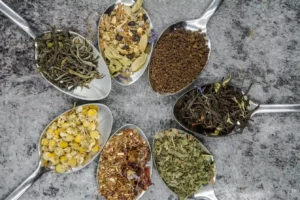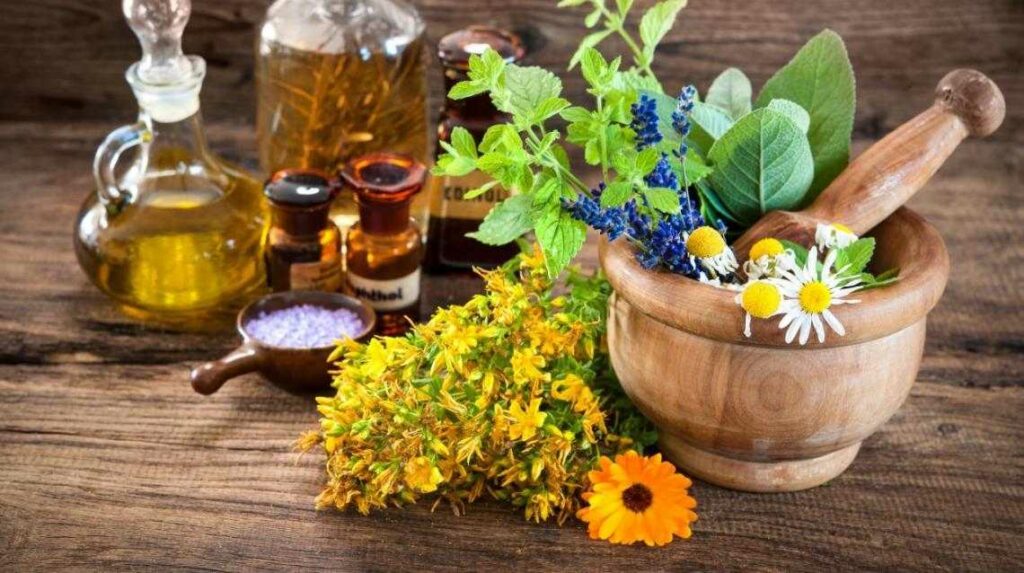Living with Polycystic Ovary Syndrome (PCOS) can be challenging, but there is hope for a holistic and natural approach to managing its symptoms. In addition to lifestyle changes, incorporating certain herbs into your routine can provide valuable support. In this blog, we’ll explore the power of nature in addressing PCOS and delve into the benefits of specific herbs to cure PCOS known for their potential to alleviate symptoms and promote hormonal balance.
Contents
Should I Consider Herbs To Cure PCOS?
 While the term “cure” may be too strong when it comes to PCOS, many individuals with PCOS explore the use of herbs as a complementary approach to managing symptoms and promoting overall well-being. Here are some factors to consider when contemplating the use of herbs for PCOS:
While the term “cure” may be too strong when it comes to PCOS, many individuals with PCOS explore the use of herbs as a complementary approach to managing symptoms and promoting overall well-being. Here are some factors to consider when contemplating the use of herbs for PCOS:
- Symptom Management: Herbs are often used to address specific symptoms associated with PCOS, such as irregular periods, hormonal imbalances, and insulin resistance. Some herbs have been traditionally used for their potential to regulate menstrual cycles, reduce androgen levels, and support metabolic health.
- Holistic Approach: Herbs are part of a holistic approach to wellness. Many people with PCOS find that combining herbal remedies with lifestyle changes, such as a balanced diet, regular exercise, and stress management, can have a positive impact on their overall health.
- Consultation with Healthcare Professionals: Before incorporating herbs into your routine, it’s crucial to consult with your healthcare provider. They can provide guidance based on your health profile, existing medications, and potential interactions with herbs. This collaboration ensures a comprehensive and safe approach to managing PCOS.
- Scientific Evidence: While some herbs have been traditionally used for PCOS, it’s essential to recognize that scientific research on the efficacy of herbal remedies for PCOS is still evolving. Some herbs may show promise in managing certain symptoms, but more research is needed to establish their effectiveness conclusively.
- Patient Experiences: Personal anecdotes and experiences from others with PCOS who have incorporated herbs into their routine can provide insights. However, individual responses to herbs can vary. So, what works for one person may not work for another.
Overall, considering herbs for PCOS can be part of a comprehensive approach to managing symptoms and promoting well-being. However, it’s essential to approach this with an informed mindset.
What Are Some Best Used Herbs To Cure PCOS?
 It’s important to note that the effectiveness of herbs can vary among individuals, and scientific research is ongoing. Before incorporating any herbs into your routine, it’s advisable to consult with a healthcare professional, especially if you have existing medical conditions or are taking medications. Here are some herbs that are often considered for PCOS management:
It’s important to note that the effectiveness of herbs can vary among individuals, and scientific research is ongoing. Before incorporating any herbs into your routine, it’s advisable to consult with a healthcare professional, especially if you have existing medical conditions or are taking medications. Here are some herbs that are often considered for PCOS management:
Vitex (Chaste Tree Berry)
Vitex, also known as Chaste Tree Berry, is a popular herb often used in managing PCOS symptoms related to irregular menstrual cycles. It is believed to influence the hormonal balance by affecting the release of luteinizing hormone (LH) and inhibiting the secretion of follicle-stimulating hormone (FSH). By doing so, Vitex may help regulate menstrual cycles and improve conditions such as luteal phase defects.
Maca Root
Maca root, native to the Andes Mountains, is recognized for its adaptogenic properties and potential to support the endocrine system. As an adaptogen, maca may help the body adapt to stress and balance hormone levels. Some studies suggest that maca may improve menstrual regularity and alleviate symptoms like hot flashes and night sweats. While research is ongoing, the anecdotal evidence and historical use of maca root highlight its potential as a supportive herb for individuals managing PCOS.
Saw Palmetto
Saw palmetto is traditionally used for its anti-androgenic properties, making it a consideration for PCOS symptoms associated with excess androgens. Women with PCOS often experience symptoms like hirsutism and acne due to elevated androgen levels. Saw palmetto may help mitigate these symptoms by inhibiting the activity of certain androgens. However, it’s important to note that individual responses to saw palmetto can vary, and more research is needed to establish its efficacy conclusively.
Turmeric
Turmeric, a vibrant yellow spice, contains curcumin, a compound known for its anti-inflammatory properties. In the context of PCOS, inflammation is often associated with insulin resistance and other metabolic issues. By reducing inflammation, turmeric may contribute to overall well-being and help manage symptoms related to PCOS. Incorporating turmeric into the diet or taking it as a supplement may be considered as part of a holistic approach to PCOS management.
Cinnamon
Cinnamon is not only a flavorful spice but also a potential ally in managing PCOS, especially for individuals with insulin resistance. Research suggests that cinnamon may improve insulin sensitivity and help regulate blood sugar levels. Since insulin resistance is a common feature of PCOS, incorporating cinnamon into the diet may support metabolic health. Whether added to meals or consumed as a supplement, cinnamon offers a flavorful and potentially beneficial addition to the lifestyle modifications recommended for individuals with PCOS.
Nettle
Nettle, known for its nutrient-rich composition, is often considered a general tonic that can contribute to overall well-being. While not specifically targeted at managing PCOS symptoms, the abundance of minerals, including iron, makes nettle a potential supplement for those with nutritional deficiencies. Iron is particularly important for women dealing with heavy menstrual bleeding. Additionally, the supportive properties of nettle can complement a holistic approach to PCOS management, contributing to the body’s overall vitality.
Spearmint
Spearmint has gained attention for its potential to address symptoms associated with excess androgens in women with PCOS. Studies suggest that spearmint tea may have anti-androgenic effects, potentially helping to reduce hirsutism and lower androgen levels. While more research is needed to establish its efficacy conclusively, incorporating spearmint tea into your routine, as part of a broader strategy, may offer a refreshing and potentially beneficial addition to PCOS management.
Ashwagandha
Ashwagandha, an adaptogenic herb with a long history in traditional medicine, is known for its stress-reducing properties. Stress management is crucial for individuals with PCOS, as stress can exacerbate hormonal imbalances. Ashwagandha may help balance cortisol levels and, in turn, support overall hormonal harmony. Some studies suggest potential benefits for reproductive health in women with PCOS, making ashwagandha a herb to consider as part of a holistic approach to managing both stress and hormonal issues.
Holy Basil (Tulsi)
Holy Basil, also known as Tulsi, is revered for its adaptogenic and anti-inflammatory properties. In the context of PCOS, where stress management is integral, Holy Basil may play a role in promoting overall well-being. By modulating the body’s response to stress, Holy Basil may indirectly contribute to hormonal balance. While research specific to PCOS is ongoing, the historical use of Holy Basil in traditional medicine underscores its potential as a supportive herb in the broader context of holistic PCOS management.
It’s important to emphasize that while these herbs show promise in managing certain aspects of PCOS, they are not standalone cures. Individual responses to herbs can vary, and it’s advisable to introduce them cautiously under the guidance of a healthcare provider.
What Are Some Risks And Limitations?
 While herbs may offer potential benefits for managing PCOS symptoms, it’s essential to be aware of potential risks and limitations associated with their use. Here are some considerations:
While herbs may offer potential benefits for managing PCOS symptoms, it’s essential to be aware of potential risks and limitations associated with their use. Here are some considerations:
- Limited Scientific Evidence
Many herbs used for PCOS management have limited scientific research supporting their efficacy. While some studies suggest positive outcomes, more rigorous research is needed to establish their effectiveness conclusively. Relying solely on anecdotal evidence or traditional use may not provide a complete picture of their safety and efficacy.
- Individual Variability
Individual responses to herbs can vary significantly. What works well for one person may not yield the same results for another. Factors such as genetics, overall health, and the specific characteristics of PCOS can influence how the body responds to herbal remedies.
- Potential Interactions
Herbs can interact with medications or other supplements you may be taking. It’s crucial to consult with a healthcare professional before incorporating herbs into your routine, especially if you are on prescribed medications.
- Quality and Purity
The quality and purity of herbal supplements can vary among brands. It’s important to choose reputable manufacturers and ensure that products are free from contaminants. Herbal supplements may also interact with other substances in the body, and the dosage and formulation can impact their safety.
- Pregnancy and Breastfeeding
Some herbs may not be safe for use during pregnancy or breastfeeding. It’s important for women who are pregnant, planning to become pregnant, or breastfeeding to consult with their healthcare provider before using any herbal remedies.
- Allergies and Sensitivities
Individuals may have allergies or sensitivities to certain herbs. It’s crucial to start with small doses when introducing a new herb and monitor for any adverse reactions. Allergic reactions can range from mild symptoms to severe. So, it’s important to discontinue use if any negative effects are observed.
- Regulatory Issues
Herbal supplements are not regulated as strictly as pharmaceutical drugs. This can lead to variations in the quality and consistency of herbal products. Some herbal supplements may also contain contaminants or undisclosed ingredients.
- Not a Substitute for Lifestyle Changes
Herbs should not be viewed as a standalone solution for PCOS. Lifestyle modifications, including a balanced diet, regular exercise, stress management, and adequate sleep, play crucial roles in managing PCOS symptoms. Relying solely on herbs without addressing lifestyle factors may limit the effectiveness of the overall approach.
It’s important to approach the use of herbs for PCOS management with caution and under the guidance of a healthcare professional. A comprehensive and personalized approach, considering individual health conditions and potential interactions, is crucial for safe and effective herbal supplementation.
Conclusion
In conclusion, while herbs to cure PCOS can be considered as part of a holistic approach, it’s crucial to approach them with realistic expectations. The potential benefits of herbs, such as Vitex, Maca Root, and Turmeric, in promoting hormonal balance and overall well-being are promising, but scientific evidence is still evolving. Individual responses vary, and herbs should be used cautiously, considering potential interactions with medications and the guidance of healthcare professionals.
While herbs may offer support, they are not a cure, and their use should be integrated into a comprehensive strategy that addresses the unique needs of each individual with PCOS. Always consult with a healthcare provider to create a personalized and safe plan for managing PCOS. If you are facing PCOS-related issues, PCOS treatment at HerMantra can help. Book your free trial online pcos treatment session now.


